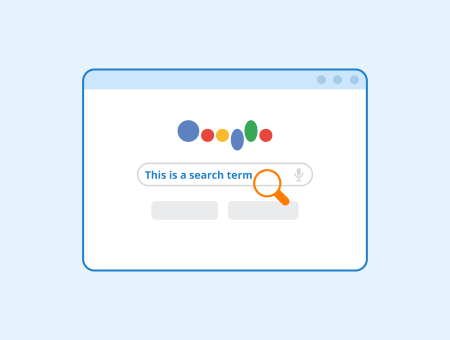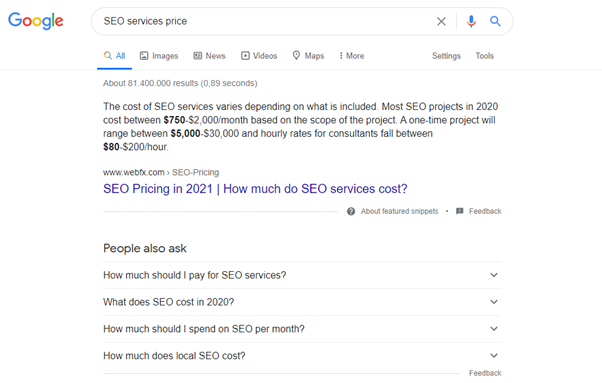Difference between revisions of "Search Term"
Ralph.ebnet (talk | contribs) (Created page with "<seo title="What is a Search Term?" metadescription="A search term is a word or phrase that is entered into a search engine by a user. Learn more…"/> == What is a search t...") |
(→Similar articles) |
||
| (5 intermediate revisions by 2 users not shown) | |||
| Line 3: | Line 3: | ||
== What is a search term? == | == What is a search term? == | ||
| − | A search term is a word or phrase that is entered into a [[Search Engine|search engine]] by a user. When searching on major web search engines like Google, Yahoo and Bing, this is usually done by typing a word using the keyboard on a phone, laptop, or computer, but this can also be done with a voice search, using Google Assistant, Siri, or Amazon Alexa for example. | + | [[File:Search-Terms.png|thumb|450px|right|alt=search term|'''Figure:''' Search Term - Author: Seobility - License: [[Creative Commons License BY-SA 4.0|CC BY-SA 4.0]]|link=https://www.seobility.net/en/wiki/images/1/14/Search-Terms.png]] |
| + | |||
| + | A search term is a word or phrase that is entered into a [[Search Engine|search engine]] by a user. When searching on major web search engines like Google, Yahoo and Bing, this is usually done by typing a word using the keyboard on a phone, laptop, or computer, but this can also be done with a [[Voice Search|voice search]], using Google Assistant, Siri, or Amazon Alexa for example. | ||
Search engines continue to improve their understanding of search terms, including the intent behind them. This has led to improved search results over the past twenty years. Since search engines base the results they show on the search term provided by a user, search terms are an important part of SEO. | Search engines continue to improve their understanding of search terms, including the intent behind them. This has led to improved search results over the past twenty years. Since search engines base the results they show on the search term provided by a user, search terms are an important part of SEO. | ||
| − | + | ||
== Other words for search term == | == Other words for search term == | ||
| − | Although there are various other words used for search term, they’re generally used interchangeably by SEOs and digital marketers. | + | Although there are various other words used for "search term", they’re generally used interchangeably by SEOs and digital marketers. |
=== Keyword/keyphrase === | === Keyword/keyphrase === | ||
| Line 25: | Line 27: | ||
== Search intent == | == Search intent == | ||
| − | The intent a user has when searching for a particular search term is called the [[Search Intent|search intent]]. Understanding search intent is one of the biggest challenges facing search engines | + | The intent a user has when searching for a particular search term is called the [[Search Intent|search intent]]. Understanding search intent is one of the biggest challenges facing search engines since it’s a complex part of [[Natural Language Processing|natural language processing]] (NLP). |
Since search terms can have multiple meanings and can be used by different people with different reasons for searching for them, it is difficult to understand what a searcher wants using just a single search term. | Since search terms can have multiple meanings and can be used by different people with different reasons for searching for them, it is difficult to understand what a searcher wants using just a single search term. | ||
| Line 41: | Line 43: | ||
There are also various keyword research tools available that provide you with indications of how often keywords are searched in Google. [[Keyword Planner|Google Keyword Planner]] is a tool that can provide you with keyword suggestions as well as [[Search Volume|search volume]] data. Even though this tool is targeted at advertisers in paid search and not for SEO, it still provides relevant information for ranking in [[Organic Search|organic search]] results pages. Similar tools are offered by other search engines that provide data on searches on their platforms. | There are also various keyword research tools available that provide you with indications of how often keywords are searched in Google. [[Keyword Planner|Google Keyword Planner]] is a tool that can provide you with keyword suggestions as well as [[Search Volume|search volume]] data. Even though this tool is targeted at advertisers in paid search and not for SEO, it still provides relevant information for ranking in [[Organic Search|organic search]] results pages. Similar tools are offered by other search engines that provide data on searches on their platforms. | ||
| − | Keyword research tools made for SEO generally provide better information for researching search terms. Although tools are great for getting a basic overview of a [[Keyword Difficulty|keyword’s difficulty]] and search volume, most SEOs still use manual analysis before deciding if a keyword is worth targeting. This has a lot to do with the search intent since the [[SERP|SERPs]] often clearly indicate the intent behind the use of a search term. | + | Keyword research tools made for SEO, such as the <html><a href="https://www.seobility.net/en/keyword-research-tool/" target="_blank">free Seobility Keyword Research Tool</a></html>, generally provide better information for researching search terms. Although tools are great for getting a basic overview of a [[Keyword Difficulty|keyword’s difficulty]] and search volume, most SEOs still use manual analysis before deciding if a keyword is worth targeting. This has a lot to do with the search intent since the [[SERP|SERPs]] often clearly indicate the intent behind the use of a search term. |
| − | + | ||
== Relevance to SEO == | == Relevance to SEO == | ||
Understanding what search terms each page on your website should target is one of the main building blocks of SEO. Keyword research is the process of finding and understanding search terms that are relevant to your website’s pages and the target audience. | Understanding what search terms each page on your website should target is one of the main building blocks of SEO. Keyword research is the process of finding and understanding search terms that are relevant to your website’s pages and the target audience. | ||
| + | |||
In keyword research, SEOs look at the search volume of keywords, the intent behind it, the keyword difficulty, and the search term’s relevance. By finding relevant search terms with low [[Keyword Difficulty|keyword difficulty]] and high search volume, websites perform far better in the search engines. | In keyword research, SEOs look at the search volume of keywords, the intent behind it, the keyword difficulty, and the search term’s relevance. By finding relevant search terms with low [[Keyword Difficulty|keyword difficulty]] and high search volume, websites perform far better in the search engines. | ||
| − | + | ||
== Related links == | == Related links == | ||
| − | * https:// | + | * <html><a href="https://www.seobility.net/en/blog/how-to-do-keyword-research/" target="_blank">Keyword Research And Analysis: How To Find The Best Keywords For Your Website - Seobility Blog</a></html> |
* https://www.searchenginejournal.com/seo-101/why-keywords-important-seo/ | * https://www.searchenginejournal.com/seo-101/why-keywords-important-seo/ | ||
| Line 59: | Line 62: | ||
[[Category:Search Engine Optimization]] | [[Category:Search Engine Optimization]] | ||
| + | |||
| + | <html><script type="application/ld+json"> | ||
| + | { | ||
| + | "@context": "https://schema.org/", | ||
| + | "@type": "ImageObject", | ||
| + | "contentUrl": "https://www.seobility.net/en/wiki/images/1/14/Search-Terms.png", | ||
| + | "license": "https://creativecommons.org/licenses/by-sa/4.0/", | ||
| + | "acquireLicensePage": "https://www.seobility.net/en/wiki/Creative_Commons_License_BY-SA_4.0" | ||
| + | } | ||
| + | </script></html> | ||
| + | |||
| + | {| class="wikitable" style="text-align:left" | ||
| + | |- | ||
| + | |'''About the author''' | ||
| + | |- | ||
| + | | [[File:Seobility S.jpg|link=|100px|left|alt=Seobility S]] The Seobility Wiki team consists of seasoned SEOs, digital marketing professionals, and business experts with combined hands-on experience in SEO, online marketing and web development. All our articles went through a multi-level editorial process to provide you with the best possible quality and truly helpful information. Learn more about <html><a href="https://www.seobility.net/en/wiki/Seobility_Wiki_Team" target="_blank">the people behind the Seobility Wiki</a></html>. | ||
| + | |} | ||
| + | |||
| + | <html><script type="application/ld+json"> | ||
| + | { | ||
| + | "@context": "https://schema.org", | ||
| + | "@type": "Article", | ||
| + | "author": { | ||
| + | "@type": "Organization", | ||
| + | "name": "Seobility", | ||
| + | "url": "https://www.seobility.net/" | ||
| + | } | ||
| + | } | ||
| + | </script></html> | ||
Latest revision as of 17:19, 6 December 2023
Contents
What is a search term?

A search term is a word or phrase that is entered into a search engine by a user. When searching on major web search engines like Google, Yahoo and Bing, this is usually done by typing a word using the keyboard on a phone, laptop, or computer, but this can also be done with a voice search, using Google Assistant, Siri, or Amazon Alexa for example.
Search engines continue to improve their understanding of search terms, including the intent behind them. This has led to improved search results over the past twenty years. Since search engines base the results they show on the search term provided by a user, search terms are an important part of SEO.
Other words for search term
Although there are various other words used for "search term", they’re generally used interchangeably by SEOs and digital marketers.
Keyword/keyphrase
Often used by SEOs to indicate a search term to target in their SEO efforts. See keyword.
Search string
Used to indicate a string of words searched on a search engine.
Search query/search phrase
Used to indicate a phrase or short sentence searched on a search engine.
Search intent
The intent a user has when searching for a particular search term is called the search intent. Understanding search intent is one of the biggest challenges facing search engines since it’s a complex part of natural language processing (NLP).
Since search terms can have multiple meanings and can be used by different people with different reasons for searching for them, it is difficult to understand what a searcher wants using just a single search term.
For example, a search term like “buy PlayStation” clearly indicates that the searcher has the intent to buy something. This means that blog posts about PlayStation or platforms for selling PlayStation games don’t satisfy their search intent.

An example of a search term on google.com with a clear search intent
Finding search terms to target
Finding the right search terms to target is one of the most important aspects of SEO. Both Google Analytics and Google Search Console provide you with indications of the number of impressions and clicks you get from searches with different search terms. These can be used to find which search terms are already driving traffic to your site.
There are also various keyword research tools available that provide you with indications of how often keywords are searched in Google. Google Keyword Planner is a tool that can provide you with keyword suggestions as well as search volume data. Even though this tool is targeted at advertisers in paid search and not for SEO, it still provides relevant information for ranking in organic search results pages. Similar tools are offered by other search engines that provide data on searches on their platforms.
Keyword research tools made for SEO, such as the free Seobility Keyword Research Tool, generally provide better information for researching search terms. Although tools are great for getting a basic overview of a keyword’s difficulty and search volume, most SEOs still use manual analysis before deciding if a keyword is worth targeting. This has a lot to do with the search intent since the SERPs often clearly indicate the intent behind the use of a search term.
Relevance to SEO
Understanding what search terms each page on your website should target is one of the main building blocks of SEO. Keyword research is the process of finding and understanding search terms that are relevant to your website’s pages and the target audience.
In keyword research, SEOs look at the search volume of keywords, the intent behind it, the keyword difficulty, and the search term’s relevance. By finding relevant search terms with low keyword difficulty and high search volume, websites perform far better in the search engines.
Related links
- Keyword Research And Analysis: How To Find The Best Keywords For Your Website - Seobility Blog
- https://www.searchenginejournal.com/seo-101/why-keywords-important-seo/
Similar articles
| About the author |
 |